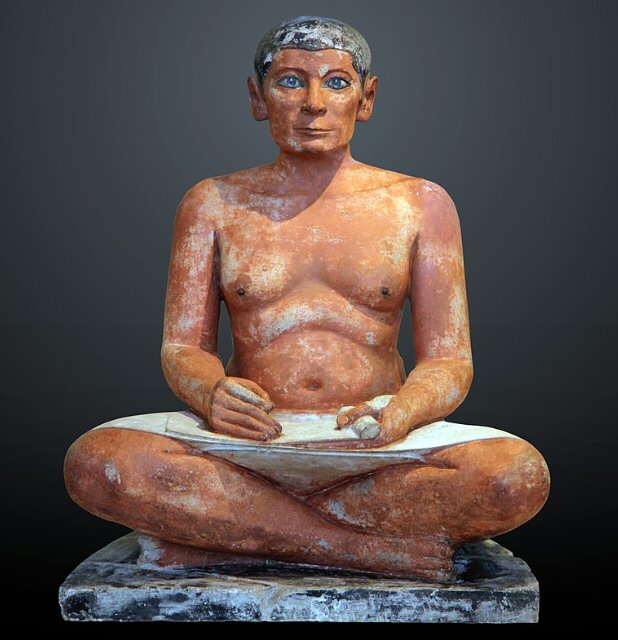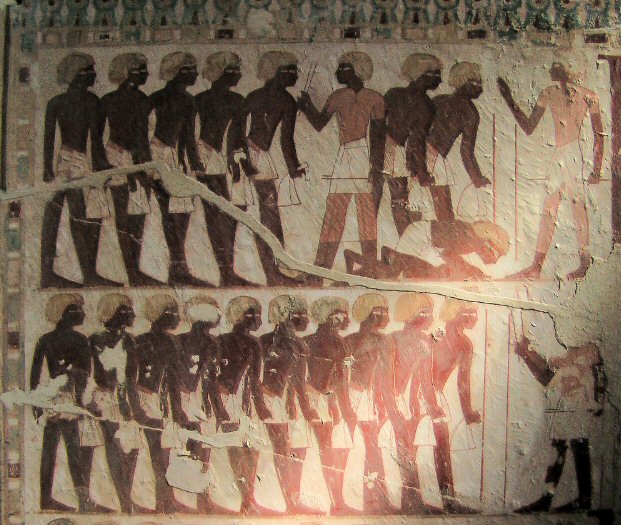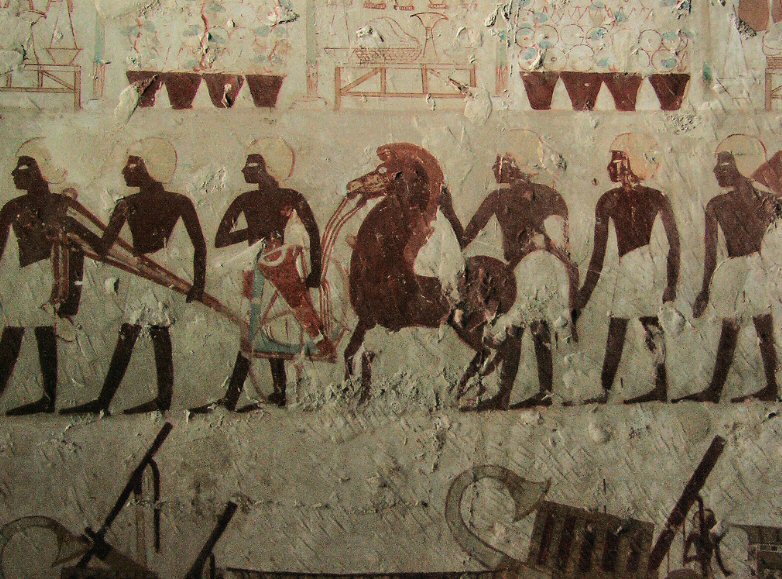The King
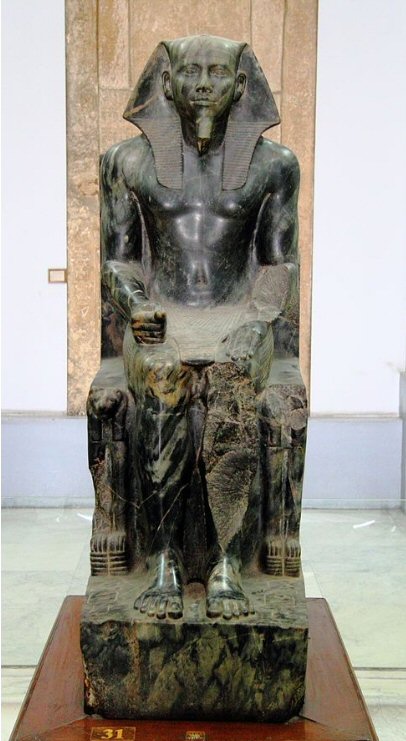
At the beginning of the Third Dynasty, the Egyptian monarchy had developed a theological dimension, with the adoption of two new names among the King's titles, namely, that of the 'Golden Horus' which first appeared with Djoser, and that of 'Son of Re', the use of which was regular from the reign of Neferirkare onwards.
The Fifth Dynasty's rise to power that the theocratic foundation had gained the upper hand over all other sectors of society, and that the kings were closely linked with a specific priesthood. This dependence on the priesthood served to reinforce the centralization of power, creating an extremely hierarchical society based on the King and the Royal Family.
A whole series of leading officials' titles were created, although it is sometimes difficult to determine the degree to which any of the titles were genuine offices, as in the case of the title 'Chief of Secrets' that can be qualified in various ways such as 'Chief of Secrets of Secret Missions', 'of all of the king's orders', 'of the Court of Justice', and of the Mysteries of the Heavens'. The purely honorific titles are easier to identify, since they were often related to roles that are known to have no correspondence with reality such as 'unique friend', which was once the role of the king's sole counselor but developed into a generic title for courtiers, as well as 'Chief of the Ten in Upper Egypt', 'Mouth of Pe', and 'Warden of Nekhen', all of which appear to have been purely symbolic offices.
The vizier

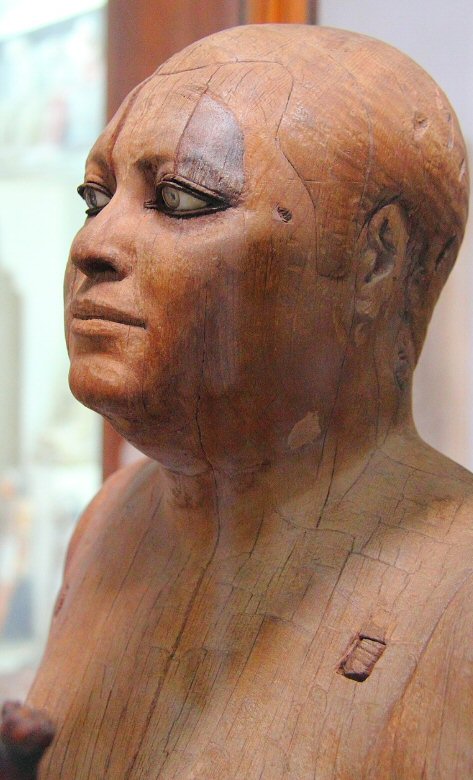
The general structure of the administration took the form of a pyramid with the king at its apex. The king was theoretically in charge of everything. In practice, however, he only dealt directly with military and religious affairs. Most of time, he acted through the vizier who appears to have first emerged in the Second Dynasty. The title was given by Sneferu to various royal princes: Nefermaat, his son Hemiunu, Kawab and others. The vizier was in a sense the chief executive, with authority in practically all areas of government. His titles included 'Chief of all Royal Works', 'Chief of the House of Weaponry', 'Chief of the Chambers of the King's Adornment', 'Royal Chancellor of Lower Egypt', and he was also the 'Chief Judge' (as Weni's intervention in the harem affairs of Pepy I demonstrates) but he did not necessarily deal with all legal matters.
The emergence of the office of vizier coincided with the appearance of the 'Chancellor of the god', a trusted person chosen directly by the king to undertake a specific task: going on an expedition to the mines or quarries, leading trading ships to foreign lands, or managing a particular royal monopoly. In order to fulfill his task, the 'Chancellor' was provided with a troop or fleet of which he was the general or admiral.
Undoubtedly, it was a sign of the weakening of central power and the increasing demands of the administration that Pepy II split the role of vizier into two separate offices dealing with Upper and Lower Egypt. The vizier controlled the four main parts of the central administration, as well as the provincial administration (which was linked with the central authority by means of the 'Chiefs of Missions'). The first department of the central administration was the 'Treasury', or more correctly the 'Double Granary' which was overseen by a 'Chief of the Double Granary' who operated under orders from the vizier. The treasury was in charge of economy as a whole, but it was particularly concerned with the collection of taxes. Taxes were derived essentially from the second major department, namely Agriculture. The department of agriculture was subdivided into two sections. The first section was concerned with the breeding and fattening of livestock, and was further subdivided into two 'Houses', each delegated to sub-director and scribal assistants. The second section of Agriculture was concerned with actual cultivation and lands recovered from the inundation, and consisted of the 'Care of the Fields', over which the 'Chief of Fields' presided, assisted by the 'Scribes of the Fields'.
The Royal Archives
The third major department of state, the Royal Archives, looked after the deeds for land-ownership. This department also held copies of documents recording civil actions, consisting essentially of contracts and testaments as well as the texts of royal decrees.
Department of Justice
The Department of Justice stood as the fourth major department which was concerned with the application of laws. The importance of each vizier was in direct proportion to his role within the theocratic system. This was demonstrated by two titles; namely, 'the Greatest of the Five of the House of Thoth' and 'Priest of Maat' which were given to viziers in the Fourth and Fifth Dynasties respectively.
Local Administration
 The central government was backed up by a system of provincial administration that relied on the division of the country into nomes. The local administration of the Delta is badly documented owing to the continuing shortage of archaeological information from that part of the country. The great mass of available data comes from Middle and Upper Egypt, but the picture that can be constructed for the South of the country was for certain equally applicable to the North.
The central government was backed up by a system of provincial administration that relied on the division of the country into nomes. The local administration of the Delta is badly documented owing to the continuing shortage of archaeological information from that part of the country. The great mass of available data comes from Middle and Upper Egypt, but the picture that can be constructed for the South of the country was for certain equally applicable to the North.
Local administration appears to have undergone considerable development during the Old Kingdom. The basic trend was covering the appointment of nomarchs so that the office became to all intents and purposes hereditary, even though it was still non-hereditary in legal terms. Lists of titles in the necropolises of provincial capitals indicate that the office of Provincial Governor began to be passed on from father to son in just the same way that the role of funerary priest was traditionally inherited, although there had previously been no such tradition for governors. This feudal system rested mainly on the economic exploitation of each individual region, which was of the nomarch's principal tasks. The Nomarch was, above all, the administrator entrusted with the maintenance of irrigation canals and the order.
Originally, this power transition from the king to the provincial governors would have been unthinkable, since the whole country theoretically belonged to the king, in his role as the personification of the Creator. The officials were therefore obliged to work for the king in return for the guarantee of their own continued existence. The pharaoh rewarded, protected and nourished his subjects both on earth and in the afterworld, and it was he who provided his servants with their funerary concessions and those aspects of their tombs that they could not obtain through their own resources: the sarcophagus, the false door, the offering table and even the statues that sustained their spirits after death.
The king was especially responsible for the provision of offerings by a funerary endowment, which was confirmed through a charter of immunity freeing the deceased's funerary estate from the obligation of paying taxes. But this principle contained the seeds of the state's destruction in that it favored the distribution of wealth and the gradual – and ultimately the irreversible – impoverishment of the king. The profits enjoyed by the recipients of these concessions acted as a drain on the economy, since they effectively lay outside the redistribution network provided by the state. But even this was not the most important effect. The most serious problem was the social mechanism that was created by these concessions: the private funerary estates became the basis of a feudal system and the recipients attempted to acquire not only wealth but also the prerogatives associated with royal property.

The system of government established in the late Old Kingdom remained in place throughout the Dynastic Period, alongside the other basic elements of society. This does not mean, however, that the system did not evolve over time: this development principally took place in terms of the relationship between central authority and the local power basis, as in the reinforcement of the power of the viziers, the remodeling of the administrative districts and the creation of new governorates.
The structure that this system imposed on the life of the country was to remain virtually unchanged until modem times. The social hierarchy continued to be based on the same values, and the nature of daily life minimally evolved, especially in the less favored strata of the population. Hardly was there any difference between the farmers of the Old and Middle Kingdoms: between the Eloquent Peasant and the Fellahin who supplied Rome with wheat.
